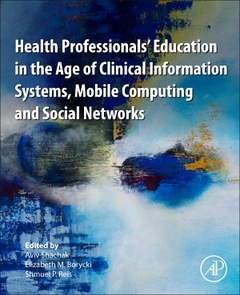Health Professionals' Education in the Age of Clinical Information Systems, Mobile Computing and Social Networks
Coordonnateurs : Shachak Aviv, Borycki Elizabeth, P. Reis Shmuel

Health Professionals' Education in the Age of Clinical Information Systems, Mobile Computing and Social Networks addresses the challenges posed by information and communication technology to health professionals? education, and the lessons learned from field experiences and research. This book is divided in three parts: "the changing landscape of information and communication technology in health care", in which it discusses how information and communication technology is transforming health care and the implications of these changes for health professions education; "experiences from the field", with real-life examples of health professionals? education in and for the digital era; and "evaluation of students and programs", addressing the use of technology to assess learners as well as the complexity of evaluating programs to enhance competence in an information technology-rich health care world
Written by leading researchers from different parts of the world, the book is a valuable source for educators and professionals who are active or wish to be part of the health informatics field.
Part 1: The changing landscape of information and communication technology (ICT) in health care: implications for health professionals’ education1. Challenges in using clinical information systems2. Patient safety and quality assurance thrusts in digital healthcare and their influence on clinicians and patients3. The changing nature of the patient-clinician relationships4. Patients’ use of ICT and its implications5. Drowning in (big) data: self-tracking and the quantified self movement6. Vison(s) for health professions education of the 21st Century
Part 2: Experiences from the field7. Medical and other health professions’ schools for the 21st century8. Training clinicians in informatics
Part 3: Evidence from research9. Barriers to accessing technology for teaching clinical students, residents, and practitioners in and out of academia10. Academic educator competencies in teaching exam room computing and informatics11. Knowledge and attitudes of learners and teachers about aspects of healthcare in the digital world12. Influence of interventions on presence and behaviour of learners and practitioners in social media13. Digital natives and tourists in health IT14. Integration of clinical and educational interventions: How when and where?15. How to evaluate educational interventions to prepare health professionals for the challenges of the information age? (methodological focus)What have we learned? Findings from evaluation studies
Summary and Future Research Directions
medical/nursing/health informatics educators; health care professionals; ICT developers.
Dr. Borycki's research interests include electronic health record education for health professionals, health information systems safety, human factors, clinical informatics, and organizational behavior and change management involving health information systems. She has authored and co-authored many articles and book chapters as well as edited several books examining the effects of health and clinical information systems upon health professional work processes and patient care outcomes. Dr. Borycki was Canada's Health Informatics Association Academic Representative to the International Medical Informatics Association (IMIA) from 2007-2013 and represented North America as a Vice President on the Board of Directors of IMIA from 2010-2013. She was also a founding chair of the IM
- Brings an in-depth understanding and background on the challenges for education of the health professions brought by information and communication technology
- Provides real-life examples on how technology is used in healthcare and how it can be used in education
- Presents valuable information in a visually appealing format with tables and figures
Date de parution : 07-2017
Ouvrage de 530 p.
19x23.3 cm
Thèmes de Health Professionals' Education in the Age of Clinical... :
Mots-clés :
Acceptance; Activity metrics; Analytics; And data visualization; Assessment; BCMA; Barcode medication administration; Best practices; Big data; Blended simulation; Bloom taxonomy; Burnout; Business intelligence; Challenges; Clinical decision support systems; Clinical informatics; Clinical reasoning; Clinician; Communication skills; Community of practice; Competencies; Competency; Competency framework; Computer; Computer-assisted decision making; Computer-associated silence; Computer-centered care; Consumer health informatics; Continuing education; Continuing medical education; Cost-effectiveness; Crew resource management; Critical appraisal; Cultural competency; Curriculum; Curriculum development; Data; Decision fatigue; Digital health; Digital professionalism; Distance education; Doctor; Doctor-patient-computer communication; E-Professionalism; E-learning; EHealth; EHealth literacy; EMAR; Education; Educational technology; Electronic communication; Electronic health record; Electronic medical record; Electronic medication administration record; Electronic records; Ethics; Evaluation; Faculty development; Family medicine; Future trends; Graduate medical education; HIV; Health care professional; Health care professionals; Health informatics; Health literacy; Healthcare; Healthcare communication; Healthcare informatics education; Healthcare professional; Healthcare quality; Heart auscultation; Hepatitis C; Higher education; Informatics; Informatics competency; Informatics education; Interruption; Kirkpatrick model; Language; Learning analytics; Levels of evaluation; MHealth; Medical education; Medical informatics; Medical simulation; Medication administration; Medication rights; Medication use process; Mentorship; Mobile device; Mobile health; Mobile technology; Motivational interviewing; Multimedia; Multitasking interference; NHS; Nurse education; Nursing; Nursing education



